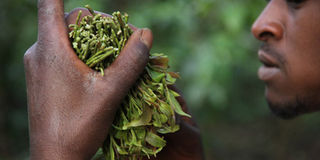Premium
Blow to Mombasa miraa traders as court declines to suspend new levies

A Mombasa County Assembly member is set to table a motion seeking to ban the chewing of miraa in public service vehicles
What you need to know:
- The traders accuse the Abdulswamad Shariff Nassir-led county government of discrimination by singling them out for punitive levies that other categories of traders are not subjected to.
- “Miraa levies are extremely high compared to levies for other products like vehicle spare parts, alcohol, tobacco, and cement which are more valuable than miraa, but only attract about 3-10 percent of the levies paid by miraa traders,” argue the traders.
Miraa traders suffered a setback after the High Court declined to issue conservatory orders suspending new levies on their business in Mombasa County.
Justice Olga Sewe on Wednesday declined the traders' request to have the temporary orders issued, saying that she had considered the nature of the application with a backdrop of submissions.
Through lawyer Timothy Njeru, the traders sought to have the orders issued, arguing that they were merited in the face of open discrimination against them.
“Open discrimination of one group of traders should not be allowed,” argued Mr Njeru, who said that the prejudice likely to be suffered by the county government of Mombasa if the orders were issued was minimal.
The county government, through lawyer Murtaza Tajbhai, opposed the grant of the conservatory orders arguing that it would be against public interest.
After the court declined to issue the orders, the traders told the court that they would abandon the application and instead argue the petition, a position that was not opposed by the county government.
Asked by the court if mediation between the two parties would be possible, the Miraa traders said that they did not believe it would be possible.
The court heard that the traders face opposition from the Governor to the county law enforcement officers, thus there is no conducive environment for negotiations.
“We believe the court is the petitioners' best hope for justice,” said Mr Njeru.
Justice Sewe directed that the petition be canvassed through written submissions and fixed the case for judgment on June 14.
The Miraa traders have sued the county government of Mombasa for excessive and punitive levies that are discriminatory and unconscionable meant to drive them out of business.
The traders accuse the Abdulswamad Shariff Nassir-led county government of discrimination by singling them out for punitive levies that other categories of traders are not subjected to.
“Miraa levies are extremely high compared to levies for other products like vehicle spare parts, alcohol, tobacco, and cement which are more valuable than miraa, but only attract about 3-10 percent of the levies paid by miraa traders,” argue the traders.
The traders said that a new levy, exclusive to miraa traders only known as ‘miraa/mugoka Sop Exclusive Licence’ of Sh15,000, has been introduced meaning that any shopkeeper who sells miraa will not only take out the annual Single Business Permit, but will be required to have the additional license which is not required for other traders.
In their petition, traders Micheck Makara, Patrick Nkiri, and Anthony Mwenda said the levies were formulated without public participation.
The petitioners argue that as stakeholders in the county and citizens of Kenya, they were not allowed to comment and participate in the process leading up to the enactment of new levies.
They argue that they are entitled to publicly participate in all processes leading to the enactment of any law and regulation, and that they were not invited to comment on the proposals contained in the Mombasa County Finance Act 2024.
According to the traders, the onslaught against Miraa traders is unwarranted since miraa is a lawful crop classified as a Scheduled Crop under the Crops Act, and it is promoted by the National Government, and funding availed to boost its production.
“The respondent (county government of Mombasa) should not be allowed to unlawfully outlaw that which parliament has enacted and made lawful,” argue the traders in their petition.
The traders also argue that in singling them and other Miraa traders for differential and discriminatory treatment, the county government has sent a message to its officers that they (traders) are unwanted and not entitled to protection of the law, thus facing harassment.
“In singling out the petitioner and other miraa traders for differential treatment which is punitive and discriminatory, the respondent has violated the dignity of the petitioners who have now been made to feel less Kenyan and vulnerable,” the traders argue.
The petitioners also claim that the county government was under an obligation to provide a reasonable explanation as to why levies for Miraa are extremely punitive in comparison to other products.
They also say that the county government did not explain why, while levies for most items have remained the same for 2024 as they were in 2023, miraa levies for 2024 have increased massively from last year’s charges.
The petitioners are seeking a declaration that miraa is a lawful crop duly classified as a Scheduled Crop under the Crops Act.
They also want a declaration that some items contained in the Mombasa County Finance Act 2024 are discriminatory against Miraa traders and thus unconstitutional.
In his affidavit, Mr Makara states that the leadership of the county government at the executive and legislative level have publicly stated that they want to drive Miraa traders out of Mombasa.





